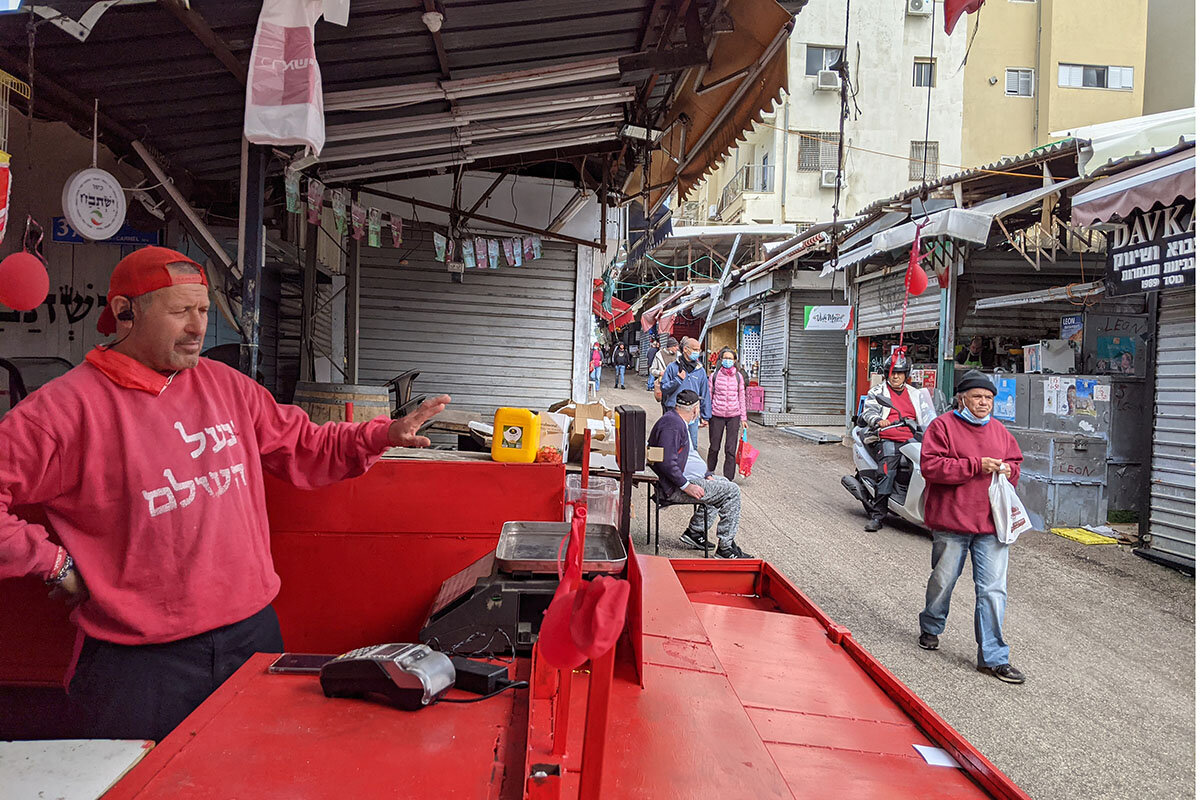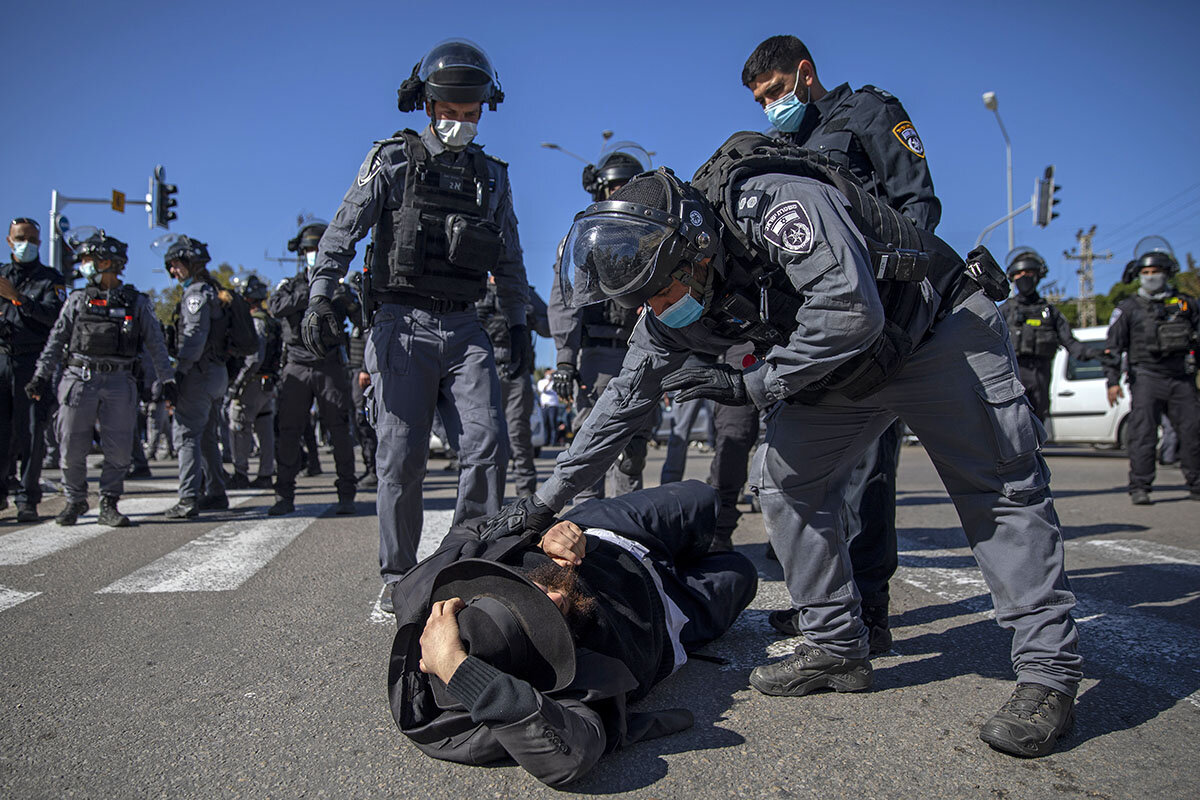How Orthodox defiance of pandemic lockdowns is cleaving Israel
Loading...
| TEL AVIV, Israel
The lockdown scenes midday Sunday in the two cities provided a COVID-19 split screen – a tale of two Israels.
In Jerusalem, tens of thousands of ultra-Orthodox mourners turned out at a tightly packed funeral for a prominent rabbi who had died from the coronavirus. Their gathering was in blatant defiance of government restrictions that police said they were helpless to enforce.
In Tel Aviv, police patrolled public squares to scare away potential crowds and ensured the stalls in open-air markets remained shuttered by the lockdown.
Why We Wrote This
If a society is divided in the face of a common enemy, what does that say about its future cohesion? For Israelis, the unequal enforcement of pandemic lockdowns is creating a “watershed moment.”
The disparity was lost on no one, and points to a festering societal division that is far deeper and older than adherence to pandemic protocols.
The restrictions are “killing us. I can’t have one person come in here, or I’ll get a fine. It’s sad to see the market closed,” says Abed Ovadia, a normally boisterous fruit seller in Tel Aviv’s Carmel Market, standing in an empty stall usually brimming with apples and pears.
When the conversation turns to the large-scale disobedience among the ultra-Orthodox, Mr. Ovadia vents.
“They defy everything. They exploit the fact that they have power in the Knesset. If they didn’t have that power, they wouldn’t behave like that. That’s why people are suffering.”
Failure to curb virus
Mr. Ovadia’s frustration resonates far and wide. Even as Israel’s unparalleled vaccination program races ahead, the country’s third pandemic lockdown in a year has failed to curb deaths or the virus’s spread.
Part of the failure stems from the government’s poor enforcement of lockdowns in neighborhoods and cities that are home to the country’s ultra-Orthodox minority, known as Haredim – Hebrew for “God-fearing.”
The community, 12% of Israel’s population, has long represented a looming social and political challenge for the country because of its high birthrates and socioeconomic separatism. But the pandemic has spurred a sense that Haredi autonomy is something that politicians and Israeli society need to confront immediately.
In addition to footage of mass weddings and funerals, television news has been filled with images of riots, fires, rock throwing, and border police violently chasing down rebellious youths – scenes deeply troubling for Israelis because of their resemblance to clashes with Palestinians in the occupied West Bank.
“We’re talking about life and death now,” says Yossi Klein Halevi, an author and fellow at the Shalom Hartman Institute, of the lockdown confrontations. “This is a watershed moment for Israeli society.”
The secular-Haredi rift – and accommodations – date back to Israel’s founding. In return for support in parliament, secular politicians have allowed the ultra-Orthodox to craft their own school curricula and have given young men exemptions from military conscription.
But the pandemic’s heavy toll has thrown into relief that the Haredim operate as an autonomous entity and can leverage their political power to resist Prime Minister Benjamin Netanyahu.
What is seen as his government’s lax approach to Haredi defiance has secular Israelis boiling over.
“Enough! Who runs this country?” tweeted parliament opposition leader Yair Lapid, saying ultra-Orthodox elementary schools stayed open while students in the rest of the country remained at home. “Whoever doesn’t comply should have funding stopped. In a sane country, there is one law for everyone.”
Analysts say much of the problem is a question of political will. Mr. Netanyahu, running for reelection in March and in the midst of a corruption trial, is being criticized as overly deferential to ultra-Orthodox politicians and rabbis, whom he needs in his coalition.
“They have their own prime minister – their rabbi. They only listen to what their rabbi says,” says Arik Golan, the owner of a pet supply store in Tel Aviv. “And their rabbi doesn’t listen to our prime minister.”
Haredi soul-searching
Yet the crisis of leadership extends to within the Haredi community, as well.
The ultra-Orthodox minority – which mostly lives apart, in impoverished, densely populated neighborhoods – has suffered the worst fallout from the pandemic. Among Israelis older than 60, nearly four times as many Haredim have died per capita than the general Jewish population, according to Israel Health Ministry data.
Even amid the clashes challenging the government’s authority, there’s also been, for the first time, some public soul-searching within the Haredi community as well as criticism of the leadership.
“Guilty are we,” read a banner headline in the Haredi newspaper Mishpacha.
Last week, following rock-throwing clashes with police in Bnei Brak, a Haredi city outside Tel Aviv, one ultra-Orthodox commentator attacked leaders for making excuses and equivocating.
“I am pulling my hair out in anger and shame at people who are burying the Haredi public and explaining why they are right,” said Moshe Glesner, an ultra-Orthodox television host on a public affairs program. “We are paying with our lives.”
To be sure, the ultra-Orthodox defiance is not confined to Israel. Communities in New York and the United Kingdom have also held mass gatherings in defiance of local restrictions. Denying the severity of the pandemic and scorning science, they insist on keeping synagogues, schools, and religious seminaries open.
Political consequences
In Israel, however, where the Haredim reject the secular Jewish state on theological grounds, the politicization of the pandemic has more grave consequences.
“Israelis are beginning to realize that Haredi separatism – the Haredi state within a state – is not just offensive, but literally a life-and-death danger,” says Mr. Klein Halevi. “Israel will not be able to remain a cutting-edge society with 12% of its society living in the 19th century. We certainly can’t continue subsidizing this separatism.”
Israel battled the pandemic in January with mixed results. It led all countries by a wide margin in vaccinations per capita. But the presence of more potent variants of the virus and the lockdown failures have kept new infection rates among the highest in the world, pressuring hospitals and resulting in a per capita death rate twice the worldwide average.
Responding to the mass funeral Sunday, Dror Mevorach, the COVID-19 ward director at Jerusalem’s Hadassah Hospital-Ein Kerem, told Israel Army Radio: “When you see this, and you know for sure that dozens, if not hundreds, will become infected, and they will infect hundreds of others, and that will lead to people dying – it’s difficult to watch.”
Israel’s failure to enforce COVID-19 restrictions on the ultra-Orthodox “exposes a bitter truth about Israel’s resilience,” wrote Ben Caspit, a columnist in the Maariv newspaper. “There is no state here. There is a loose confederation of tribes, devoid of central authority, common values, ​​or a common goal. Israel’s façade is disintegrating into fragments live on television.”
Self-interest vs. the state
The bitterness over the lack of unity may have a cost. A Jan. 26 survey by Channel 12 news found that 61% of Israelis want the next coalition to exclude ultra-Orthodox parties, reflecting how the pandemic has made the independence enjoyed by Israel’s Haredim a top issue, with broad implications.
In normal times, few Israelis focus on what’s necessary to end the ultra-Orthodox separation and integrate the community, says Gilad Malach, an expert on the Haredi community at the Israel Democracy Institute: teaching a general studies curriculum, ensuring young men get jobs rather than remain in yeshivot, and ending the exemption for military conscription.
But after a year of the pandemic, Israelis recognize the immediate consequences of allowing the ultra-Orthodox to persist as a state within a state.
“Ultra-Orthodox society is very clear that it sees itself as having full autonomy whether to comply or not with the orders of the state,” Mr. Malach says. “If you don’t comply regarding issues of life and death, will you comply with the orders of education?
“When there’s a contradiction between their self-interest and the needs of the state, they prefer their self-interest – their community wins. This is the challenge of the state.”










